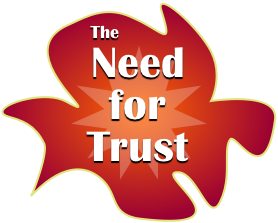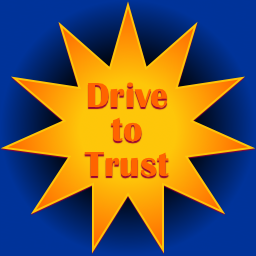Drive to Trust:A Rare Opportunity to Increase Business and Social Impact
Drive to Trust shows firms how to build trust at scale, so they grow their social and business impact more consistently and sustainably. CSRA guides firms in digitizing trust building. |
Drive to Trust is CSRA’s special initiative for partnering with firms to build trust with customers, donors, employees and other stakeholders by breaking some rules in social media and marketing. It’s a rare chance to change the game because trust moves all kinds of revenue and cost levers in ways that rivals can’t copy.
![]() Chicago Social Empowerment—Drive to Trust’s new cohort is a rare chance for nonprofits to use experiential social media to generate more donations, volunteers, and community support. Learn more about the cohort…
Chicago Social Empowerment—Drive to Trust’s new cohort is a rare chance for nonprofits to use experiential social media to generate more donations, volunteers, and community support. Learn more about the cohort…
![]() The Need for Trust—Most orgs don’t realize that their processes and policies discourage people from trusting them. This hurts business because it customers, employees, and supporters care less. Learn about the Need for Trust…
The Need for Trust—Most orgs don’t realize that their processes and policies discourage people from trusting them. This hurts business because it customers, employees, and supporters care less. Learn about the Need for Trust…
![]() The Drive to Trust—Drive to Trust is an accelerated program that shows partners how to use experiential social media to generate much better business outcomes than social media marketing. More on the Drive to Trust and how it works…
The Drive to Trust—Drive to Trust is an accelerated program that shows partners how to use experiential social media to generate much better business outcomes than social media marketing. More on the Drive to Trust and how it works…
![]() Supporting Trust—People often ask what kinds of firms make good partners, so they can refer potential partners more easily. Here are some patterns and lists that help to recognize likely candidates. More on Supporting Trust…
Supporting Trust—People often ask what kinds of firms make good partners, so they can refer potential partners more easily. Here are some patterns and lists that help to recognize likely candidates. More on Supporting Trust…
![]() Trust Deep Dive—Most executives think trust is nice, but they don’t trust it! I appreciate this because I discovered the power of trust accidentally while analyzing large sets of digital social data. Trust impacts people much more than firms appreciate, so it’s an opportunity to change the rules of their businesses. Learn more at Trust Deep Dive…
Trust Deep Dive—Most executives think trust is nice, but they don’t trust it! I appreciate this because I discovered the power of trust accidentally while analyzing large sets of digital social data. Trust impacts people much more than firms appreciate, so it’s an opportunity to change the rules of their businesses. Learn more at Trust Deep Dive…
| The Need for Trust |
 While practicing and refining experiential social media for a decade, I’ve developed a repeatable, efficient way to build trust at scale. Trust building in digital public is a new powerful, authentic way to strengthen businesses because it harmonizes with the digital empowerment of the people who are most important to firms—customers, employees, business partners, regulators, government officials, and their influencers. Trust building is the heart of successful initiatives in employee engagement, customer experience and customer success. I built the Social Channel App to explain why and how digital trust building works.
While practicing and refining experiential social media for a decade, I’ve developed a repeatable, efficient way to build trust at scale. Trust building in digital public is a new powerful, authentic way to strengthen businesses because it harmonizes with the digital empowerment of the people who are most important to firms—customers, employees, business partners, regulators, government officials, and their influencers. Trust building is the heart of successful initiatives in employee engagement, customer experience and customer success. I built the Social Channel App to explain why and how digital trust building works.
Trust builds strong businesses because people want to buy from them, to work with them, to support them. That means they have lower churn, less price/pay sensitivity, greater lifetime value, and many more good things. To earn such a prize, though, most firms have to make significant changes in how they relate to people, so people can trust them.
Most businesses don’t realize that their processes and policies discourage people from trusting them. To fix this, you can’t ask or coerce people to trust you—you have to trust them and give them the data that all people use to adjust their trust meters. I’ve discovered what that data is and how to use it to help people trust firms. This is the focus of experiential social media.
The stakes are huge. Gartner calls customer experience the final frontier of competitive advantage, but firms leave most of the money on the table by grounding their CX initiatives in traditional marketing, service and promotions that encourage people to mistrust them. When you show people that you trust them through your actions in digital public, all of their feelings about you change, and their relationships with you shift from transactional to trusted. It is very hard for competitors to take away a trusted customer or employee from you.
I am well along to proving that trust-building outperforms traditional promotion-led social media, and Drive to Trust will take us further along. The USI case study tested experiential social media, and results show that ecommerce results increase significantly when social media teams trust and support people online without promoting the brand. People buy more when you don’t push them to buy. Pushy selling kills trust.
Think about that a minute. Selling is a sacred cow of business, but I’ve learned that helping people in digital public drives revenue more than promoting products and brands in social media. Very simply, Serve, Don’t Sell. How you serve people shows who you are better than talking about it. You can drill down in Trust Deep Dive.
| Drive to Trust |

Drive to Trust gives firms in diverse sectors the chance to build trust with experiential social media in an accelerated program while measuring results quantitatively. Partner firms learn how to interact in social media, so they generate more sales, donations, support and other business outcomes. When firms learn that they get better business outcomes by serving people in digital public without self-promotion, the world will change for the better. That’s Drive to Trust’s mission. Drive to Trust generates immense social benefits while building stronger, more resilient, more successful organizations and communities.
When firms see the quantitative results of trust-led interaction and relationships, they can also use their knowledge to improve the business results of their existing social media, marketing and sales.
How It Works
- Partners work with CSRA on an experiential social media strategy that recommends several pilots. CSRA conducts the strategy with support from each partner.
- Then we build a team with partner and CSRA people to conduct an experiential social media pilot. Each pilot’s results are quantitatively and qualitatively measured by experiential trust metrics and by their impact on traditional business outcomes (like USI’s ecommerce results).
- During pilots, CSRA team members mentor partner teams on experiential interactions as well as state-of-the-art social media operations that boost efficiency.
- Then CSRA and partners participate in public case studies that get the word out about the power of trust at scale. We talk about the impact inside and outside each partner firm. Of course, partners don’t have to disclose proprietary information, but the goal is to share results as openly as possible.
- Partners are recognized for developing trust by their public actions, not mere PR style accolades.
 Partners have the knowledge and tools to continue building experiential after the pilot.
Partners have the knowledge and tools to continue building experiential after the pilot.- Partners have the option to join a cohort. Cohort members serve people with complementary services/products, and CSRA facilitates collaboration sessions to boost the breadth and depth of their learning and results. Read about Cohort One: Chicago Social Empowerment.
What Each Partner Needs
- During the strategy, CSRA conducts ethnographic research of social media to develop behavioral insights into partner firms’ most important people (customers, donors, employees, volunteers, channel, etc.). Partner sponsor executives need to collaborate with CSRA to verify results.
- During the pilots, each partner needs to contribute 2-4 part-time team members or equivalents to form an experiential team with CSRA teams. Partner team members can be chunked into small volunteer roles to maximize mentoring and minimize time away from their regular roles. Each pilot requires a part-time manager and champion who also participate in reporting calls or meetings to discuss results.
- Partners can maximize mentoring benefits if they have a private social network available, but this is not required.
- Partners champion Drive to Trust and support CSRA in creating public case studies and in discussing results with interested parties. They also get their own versions of the case studies.
CSRA is supporting Drive to Trust by forgiving one half our fees.
| Supporting Drive to Trust |
Who in the World?..
 Many people ask me who makes a good partner for Drive to Trust. The answer isn’t obvious because literally any firm can improve productivity and business by increasing trust. That said, the best potential partners tend to face these challenges or have these characteristics:
Many people ask me who makes a good partner for Drive to Trust. The answer isn’t obvious because literally any firm can improve productivity and business by increasing trust. That said, the best potential partners tend to face these challenges or have these characteristics:
Challenges of Drive to Trust Partners
Some of the best potential partners don’t know they have a trust problem, but they struggle with low-trust business challenges, which are really symptoms of transactional relationships. They need a system to treat the root cause of these challenges:
- Nonprofits with low advocacy among volunteers, donors and beneficiaries.
- Commercial firms with high churn and promotional costs.
- Low share of wallet and low customer lifetime value.
- High service and return costs.
- Negative customer and employee reviews.
- High employee turnover and training costs.
Characteristics of Drive to Trust Partners
Some firms and their leaders make good partners because their cultures and missions resonate with building trust and caring for people. They need an approach to magnify their missions and cultures. Their leaders tend to:
- Be more oriented to people, less to promotion (nonprofits, cause-oriented, impact-focused).
- Think about the impact of relationship and/or trust on their businesses (B2B, healthcare, financial services, law, professional services).
- Have (or have had) direct customer/member/constituent contact (retail, ecommerce, government).
- Be big picture people, think long-term, strategically.
- Like doing new things, pioneering, blazing their own trails (startups, entrepreneurs).
- Be in turnaround situations; not business as usual.
- Be in serving organizations (nonprofits, government).
How to Support Drive to Trust
- If you know a person or a firm that might be a good partner, please share this page using the sharing icons at the bottom of this page. The green one far right has many more options.
- If you’d like to explore being a partner, I’d be glad to share more about Drive to Trust with you in person, via video or phone call. Contact me to learn more.
- I also invite questions in comments below. Thanks in advance for your interest and support!
If you like what we’re doing, tell people about us. Use the sharing icons below, or just share our URL anywhere, anytime => https://drivetotrust.org
| How Trust Works (Diving Deeper) |
In Drive to Trust’s first video trailer, I share the entire concept in less than four minutes Here’s the gist (print). Speaking of print, here on rollyson.net, my posts have increasingly focused on trust during the past couple years as my findings from ethnographic research consistently showed its breakthrough importance. Here is a select list:
- How firms unknowingly discourage people from trusting them: Many Businesses Live in Fear—How to Break Free.
- Why firms need to stop thinking like businesses, and start thinking like people: On Human Experience.
- The breakthrough power of trusting customers: How Trusting Customers Drives Profit.
- How trust monetizes: The Trust Business Chain Reaction.
- The USI case study: slides or text (more detail).
- Short background on experiential social media.
- How we start building empathy and trust: Ethnographic Research of Social Media.



Leave a Reply
You must be logged in to post a comment.